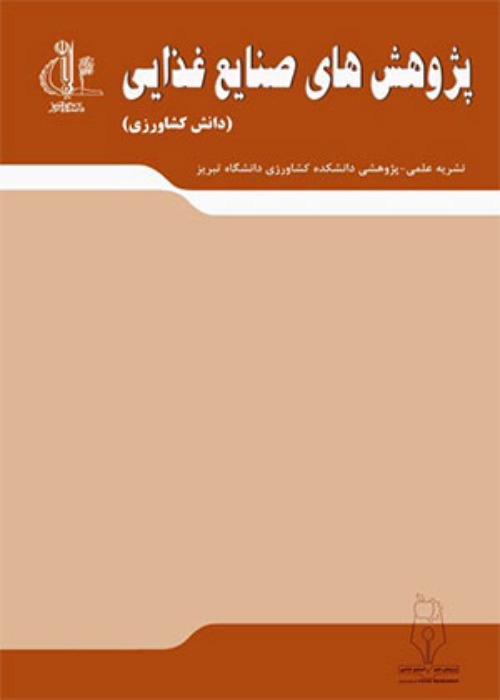Investigation the effects of the native probiotic strains of Lactobacillus delbrueckii and Pediococcus pentosaceus on the chemical, microbial and sensory properties of doogh during storage
Probiotic bacteria are live microorganisms which have beneficial effects on the host body, if consumed at sufficient amounts. Some positive effects of such bacteria are as follows: reduction of lactose intolerance, inhibition of colon, intestine, liver and breast cancers, reduction of blood cholesterol, improving and boosting the immune system, infection prevention, treating and inhibiting from acute diarrhea, reduction of intestinal inflammation, reduction of food allergies or Eczema in children, improving the absorption of minerals and vitamins, and prevention of the growth and replication of harmful bacteria. In addition to longer shelf life, fermented foods have flavor and odor characteristics which are directly or indirectly associated with the fermenting microorganisms. In many cases, the vitamin content of fermented foods and the digestibility of raw materials are increased. Moreover, fermentation decreases the toxicity of some food ingredients. Functional food products such as yoghurt and Doogh could be appropriate carriers for the transfer of such bacteria to the intestinal epithelial cells. The purpose of this research is to examine the viability of the probiotic strains of Lactobacillus delbrueckii and Pediococcus pentosaceus in Doogh as well as investigating their effects on the chemical, microbial and sensory properties of this dairy product during storage.
In this study, the probiotic strains of L. delbrueckii and P. pentosaceus were used to produce Iranian traditional Doogh. pH was measured on the 1st, 7th, 14th and 21st day using the Lab827 pH meter (Metrohm, Switzerland). For microbial count, 25 ml of the sample was mixed with 225 ml of sterile sodium citrate 0.2% and considered to be 10-1 dilution after homogenization. The dilution series up to 10-7 were prepared by adding 1 ml of the content of each test tube to 9 ml of the sterile ringer solution. For the microbial total count, plate count agar was applied at 37°C for 48 h. For the yeast and mold count, yeast extract glucose chloramphenicol was utilized at 25°C for 5 days, and for the coliform count, violet red bile agar was employed along with incubation at 37°C for 48 h. Various properties of the Doogh samples were determined using 9-point hedonic scale during storage. A number of 20 panelists were chosen according to the degree diagnosis or quality level test. A number of 20 samples were prepared from each treatment and given to the panelists with a form scaled with 9 points (9=desirable, 1=undesirable) to fill it out considering their own tastes and comments. The sensory properties were as follows: mouthfeel, flavor, odor and overall acceptability.
The results revealed that L. delbrueckii reduced the pH about 1 unit after 21 days of storage at 25°C, while the reduction of pH in the Doogh stored at 4°C was about 50% of this value. For P. pentosaceus, the pH reduction was equal to 0.9 and 0.5 after 21 days of storage at 25 and 4°C respectively. During the 21 days of storage of the samples at 4°C, no growth of molds and yeasts was observed. Although molds and yeast could grow in the samples stored at 25°C for 21 days, application of L. delbrueckii and P. pentosaceus could decrease their growth relative to the control. On the 21st day, L. delbrueckii reduced two logarithmic cycles of the molds and yeasts (compared with the control), while P. pentosaceus decreased one logarithmic cycle. The results also showed that no coliform growth was observed in the samples stored at 4°C. Coliform growth depends on the food nature and its storage conditions. In general, coliforms grow slowly at temperatures under 6°C. In the doogh samples stored at 25°C, the decreasing effects of L. delbrueckii and P. pentosaceus were significant on the coliform growth, compared with the control. In this study, the microbial total count was also performed on different days and the results demonstrated that Doogh storage at 4°C caused a decrease in the number of the inoculated bacteria during storage. One of the reasons behind this could be the storage temperature. Refrigerated storage is not suitable for the growth and replication of mesophilic bacteria. Therefore, a decrease in the microbial population was observed after some days and the greatest reduction occurred in the fourth week. In the Doogh samples stored at 25°C, the number of bacteria increased in the second week relative to the first one. In the third week, a slight reduction was observed in the bacterial count, compared with the second week. This could be ascribed to the increase in the sample pH and the inability of the bacteria to replicate and grow. The largest reduction in the number of the bacteria was observed on the 21st day of storage which was about two logarithmic cycles lower than the second week. The results of the sensory evaluation showed that the Doogh samples inoculated with L. delbrueckii and P. pentosaceus achieved higher scores in terms of mouthfeel, flavor, odor and overall acceptability in comparison with the control.
L. delbrueckii was more potent in reducing the samples pH. In addition, its protective effect was more pronounced in preventing the growth of coliforms, molds and yeasts. On the sensory properties, including mouthfeel, flavor, odor and overall acceptability, the effects of the probiotic Doogh samples were significant compared with the control. As a result, the probiotic bacteria used in this research not only did not have undesirable effects on the chemical, microbial and sensory properties of Doogh, but also improved them. In conclusion, L. delbrueckii and P. pediococcus could be appropriate candidates for industrial uses in this area after complementary experiments.
- حق عضویت دریافتی صرف حمایت از نشریات عضو و نگهداری، تکمیل و توسعه مگیران میشود.
- پرداخت حق اشتراک و دانلود مقالات اجازه بازنشر آن در سایر رسانههای چاپی و دیجیتال را به کاربر نمیدهد.


